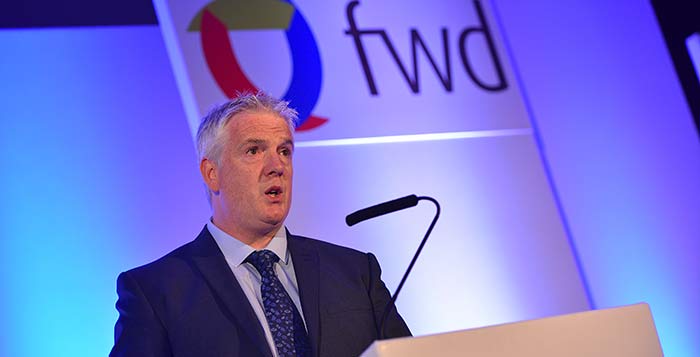Technology is driving our future and the independent trade needs to take control of it, Craig O’Connor, managing director of Dee Bee, the Grimsby-based wholesaler, told the Federation of Wholesale Distributors conference earlier this month.
With a dry wit, he sketched how his company had worked with retailers to drive the use of EPoS and the resulting improvement in sales.
One shop grew from £12,000 a week to £28,000 a week on the back of an EPoS installation and the benefits it delivered. O’Connor quipped that the shopkeeper had been coaxed into using technology by installing Solitaire on his computer. .
It is clear that there is a big divide between the forward-thinking retailers who persuade themselves to invest in technology and those who have to be nudged by their suppliers.
The first aim for O’Connor, who joined Dee Bee in 2004, was to develop symbol group solutions for independents. However, he had a shock when his largest customers left. The reason was not his prices or his service, but the fact that retailers wanted the benefit of EPoS.
What is that? It is simple, says O’Connor. His retailers that use EPoS are now time-rich and data-hungry. They trust the wholesaler to ensure that their shop has clean and up-to-date price lists and stock levels. They can then use the extra time to focus on shoppers.
One customer has more than 400 loyalty card members, which is managed by the Re-Scan technology that Dee Bee has developed. Her customers have remained loyal despite competition from a large Co-op almost next door. In a promotional video she explains how her shoppers come in and talk about what they are going to spend their loyalty points on.
Closer data links with retailers change how wholesalers operate. Dee Bee is now 85% delivered and 15% cash and carry, the reverse of how it used to operate, and 12% of its retailers account for 40% of its sales.
Dee Bee’s footprint extends 125 miles south to Northampton, 150 miles west to Liverpool and Blackpool and 70 miles north to Scarborough. This footprint is both a strength and a weakness. Wholesalers aim to control the supply chain from manufacturer, to independent retailer, to consumer. They would like to sell this to the manufacturer in return for better margins.
What wholesalers might do instead is apply their thinking down the chain to help independent retailers more. O’Connor sees his company’s strength as its ability to think as a retailer in terms of developing business solutions. His future success may come more from his ability to get retailers to communicate with consumers.
What do I mean? As Antony Welfare, a keynote speaker at the Local Shop Summit this October explained to me: When he ran a local store he could not interrupt a shopper to show them a new line. Their time was precious. They had a fixed mission.
But today, using a mobile phone in their own time, they can browse stuff that they are interested in. Thirsty, but don’t want to carry a 1.5litre bottle of water around? Here’s my local shop showing a small cool interesting bottle on my smart phone as I pass by. Maybe I will just nip in store and get that!
To quote O’Connor again: with technology it is hard to keep pace. But you know you have to.



Comments
This article doesn't have any comments yet, be the first!